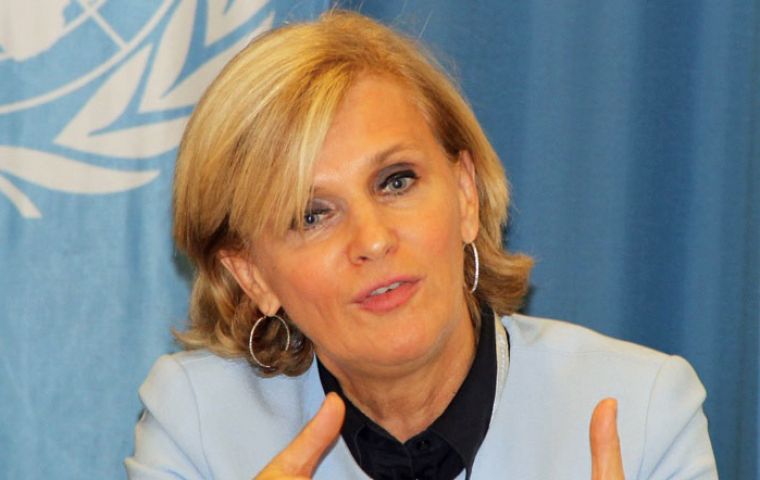MercoPress. South Atlantic News Agency
Radical increase in water and sanitation investment required to meet development targets
 “Almost two billion people use a source of drinking-water contaminated with feces, putting them at risk of cholera, dysentery, typhoid and polio,” says Dr Maria Neira
“Almost two billion people use a source of drinking-water contaminated with feces, putting them at risk of cholera, dysentery, typhoid and polio,” says Dr Maria Neira  “Contaminated drinking-water is estimated to cause more than 500 000 diarrheal deaths each year and is a major factor in several neglected tropical diseases”
“Contaminated drinking-water is estimated to cause more than 500 000 diarrheal deaths each year and is a major factor in several neglected tropical diseases”  In order to meet the SDG global targets, the World Bank estimates investments in infrastructure need to triple to US $114 billion per year
In order to meet the SDG global targets, the World Bank estimates investments in infrastructure need to triple to US $114 billion per year Countries are not increasing spending fast enough to meet the water and sanitation targets under the Sustainable Development Goals (SDGs), says a new report published by the World Health Organization (WHO) on behalf of UN-Water – the United Nations inter-agency coordination mechanism for all freshwater-related issues, including sanitation.
“Today, almost two billion people use a source of drinking-water contaminated with feces, putting them at risk of contracting cholera, dysentery, typhoid and polio,” says Dr Maria Neira, WHO Director, Department of Public Health, Environmental and Social Determinants of Health.
“Contaminated drinking-water is estimated to cause more than 500 000 diarrheal deaths each year and is a major factor in several neglected tropical diseases, including intestinal worms, schistosomiasis, and trachoma,” added Neira.
The report stresses that countries will not meet global aspirations of universal access to safe drinking-water and sanitation unless steps are taken to use financial resources more efficiently and increase efforts to identify new sources of funding.
According to the UN-Water Global Analysis and Assessment of Sanitation and Drinking-Water (GLAAS) 2017 report, countries have increased their budgets for water, sanitation and hygiene at an annual average rate of 4.9% over the last three years. Yet, 80% of countries report that water, sanitation and hygiene (WASH) financing is still insufficient to meet nationally-defined targets for WASH services.
In many developing countries, current national coverage targets are based on achieving access to basic infrastructure, which may not always provide continuously safe and reliable services. Planned investments have yet to take into account the much more ambitious SDG targets, which aim for universal access to safely managed water and sanitation services by 2030.
In order to meet the SDG global targets, the World Bank estimates investments in infrastructure need to triple to US $114 billion per year – a figure which does not include operating and maintenance costs.
While the funding gap is vast, 147 countries have previously demonstrated the ability to mobilize the resources required to meet the Millennium Development Goal target of halving the proportion of people without an improved source of water, and 95 met the corresponding target for sanitation. The much more ambitious SDG targets will require collective, coordinated and innovative efforts to mobilize even higher levels of funding from all sources: taxes, tariffs (payments and labor from households), and transfers from donors.
“This is a challenge we have the ability to solve,” says Guy Ryder, Chair of UN-Water and Director-General of the International Labour Organization. “Increased investments in water and sanitation can yield substantial benefits for human health and development, generate employment and make sure that we leave no one behind.”




Top Comments
Disclaimer & comment rules-

Read all commentsA lot of the overseas aid goes in the pockets of those in charge.Not very much goes to the poor who really need it. I use to donate to charity but found out that the Ceo's of charities get paid too much.
Apr 13th, 2017 - 04:07 pm 0Commenting for this story is now closed.
If you have a Facebook account, become a fan and comment on our Facebook Page!